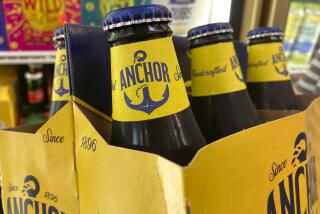Heineken to buy Mexico’s Femsa beer unit in $5.5-billion deal
- Share via
Reporting from Bogota, Colombia — Heineken’s $5.5-billion, all-stock acquisition of Mexican beer brands including Tecate, Dos Equis and Sol is the latest beer industry merger, but probablynot the last, as global breweries chase growth in emerging markets.
With beer sales in the U.S. and other industrialized nations stagnant or falling, companies are consolidating to share heavy marketing and distribution costs. They’re also looking to tap rising disposable incomes of young, thirsty consumers in developing countries.
The deal for the beer labels of Mexican giant Femsa, announced Monday, solidifies Netherlands-based Heineken’s place among the world’s top three brewers.
The others are Anheuser-Busch InBev of Belgium, which swallowed St. Louis-based Anheuser-Busch; and Britain’s SABMiller, whose holdings include MillerCoors of Chicago.
Femsa’s Tecate brand, which is made at a towering brewery in Baja California 60 miles southeast of San Diego, is the second-most popular beer exported to the U.S. from Mexico. (Tops is Corona, the flagship brand of Femsa’s rival, Grupo Modelo, which is 50% owned by InBev.)
Femsa is not selling its Coca-Coca bottling operation, Latin America’s largest. The Monterrey company will also hold on to its Oxxo convenience store chain.
The acquisition of Femsa’s brands -- including debt that Heineken will assume, the deal is worth $7.6 billion -- will give Heineken 40% of its sales in developing countries, according to Ben Steinman, editor of trade journal Beer Marketer’s Insights. That will help the company reduce its dependence on mature European markets. Before the global financial downturn, emerging-market beer sales were growing at a robust 5% annual clip.
By contrast, pre-crisis beer consumption in the U.S. and other industrialized nations grew barely 1% a year over the last decade, and sales will slow further in coming years, said Tom Pirko, an analyst with Santa Barbara-based industry consultancy Bevmark.
“Mature markets don’t have the population growth to drive sales,” Pirko said.
U.S. beer sales were about $100 billion last year, down 2% from 2008, said Steinman. He said that’s the biggest decline in 50 years.
“The core U.S. market is 21-year-old to 27-year-old blue-collar males, and that fellow got hit hard by the crisis,” Steinman said.
But U.S. beer sales have also been flattened by changing consumer preferences, including the rising popularity of wine and other beverages. Regional craft and microbrewery beers now account for 5% to 10% of all beer quaffed, Steinman said.
The spate of mergers over the last decade has created an effective beer duopoly in the U.S. market, according to Pirko, with mega-players InBev and SABMiller controlling 80% of sales.
Those mergers include Inbev’s 2008 acquisition of Anheuser-Busch for $52 billion and its 2004 purchase of AnBev of Brazil for $11.2 billion. SABMiller paid $5.6 billion for Miller in 2002 and $9 billion for Colombia-based Bavaria in 2005, a deal that made it Latin America’s second-largest beer company after InBev.
In a recent interview at his office here, SABMiller’s Colombia chief, Barry Smith, said emerging markets offer not only favorable demographics but also the potential to move consumers into higher-margin premium brands as they grow more affluent.
That has been SABMiller’s strategy in Colombia. The company has limited price increases on its basic brands while introducing four high-margin premium labels to boost profits.
But emerging markets can be tricky, Smith said. China, where SABMiller sells its Snow brand, is now the world’s largest beer-guzzling market. But it’s one that’s minimally profitable because beer is still considered a commodity and premium labels have generated relatively modest sales.
Tecate, Corona and other Mexican brands received an export boost in the mid-1990s from that nation’s free-trade agreement with the United States as well as a 1994 peso devaluation that made Mexican beer more affordable in foreign countries.
The consolidation trend still has some froth.
Pirko said Foster’s of Australia could be in play and Japanese brewing giants Kirin and Sapporo may merge or be sold. Private equity firm Kohlberg Kravis Roberts & Co. is involved in Korean beer market consolidation, he said.
“You have all these trends and a few unanswered questions, like who will own China and who will own India,” Pirko said.
Kraul is a special correspondent.
More to Read
Inside the business of entertainment
The Wide Shot brings you news, analysis and insights on everything from streaming wars to production — and what it all means for the future.
You may occasionally receive promotional content from the Los Angeles Times.










